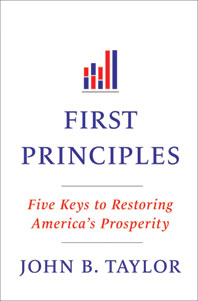 The path toward future American prosperity runs straight through the nation’s historical adherence to first principles of economic freedom. That’s the assessment of Stanford economist John B., Taylor, who makes his case in the recent book First Principles: Five Keys to Restoring America’s Prosperity.
The path toward future American prosperity runs straight through the nation’s historical adherence to first principles of economic freedom. That’s the assessment of Stanford economist John B., Taylor, who makes his case in the recent book First Principles: Five Keys to Restoring America’s Prosperity.
Economic freedom sounds great, you say, but what does Taylor mean when he uses that term?
At its most basic level, economic freedom means that families, individuals, and entrepreneurs are free to decide what to produce, what to consume, what to buy and sell, and how to help others. The American vision was that those decisions would be made within a predictable government policy framework based on the rule of law with strong incentives derived from the market system and with a clearly limited role for government.
The principles of economic freedom are naturally intertwined with political freedom — speech, press, assembly, religion. Excessive government interventions and economic controls will tend to constrain people’s freedom to speak out or take public political positions for fear of retribution through more interventions and controls. The loss of political freedom can in turn reduce economic freedom further.
Taylor uses those principles to develop a series of recommendations for steering the American economy back to the right path. None of his recommendations involves tax increases.
There are four reasons why tax increases are not part of my proposals. First, higher tax rates would further reduce incentives to work or hire or expand and are inadvisable as a policy to restore economic growth, especially in a slow recovery period. Second, spending is the primary culprit in the deficit and debt problem. To defuse the debt explosion with tax increases rather than reductions in spending growth would require tax rates of an untenable 75 percent or more. We have to focus on spending. Third, the reform proposals purposely do not expand the entitlement state. … [F]urther growth of entitlements would be detrimental per se. It would be a mistake to raise tax rates to fund an expansion of entitlements. Fourth, if we wish to affect the progressivity of entitlements, rather than raising taxes we could adjust the entitlements themselves by, for example, adjusting the Social Security system to tilt the benefits away from higher-income groups.
While no fan of tax increases, Taylor calls tax reform “an essential part of a pro-growth strategy,” along with entitlement reform, regulatory reform, monetary reform, and budget reform.


